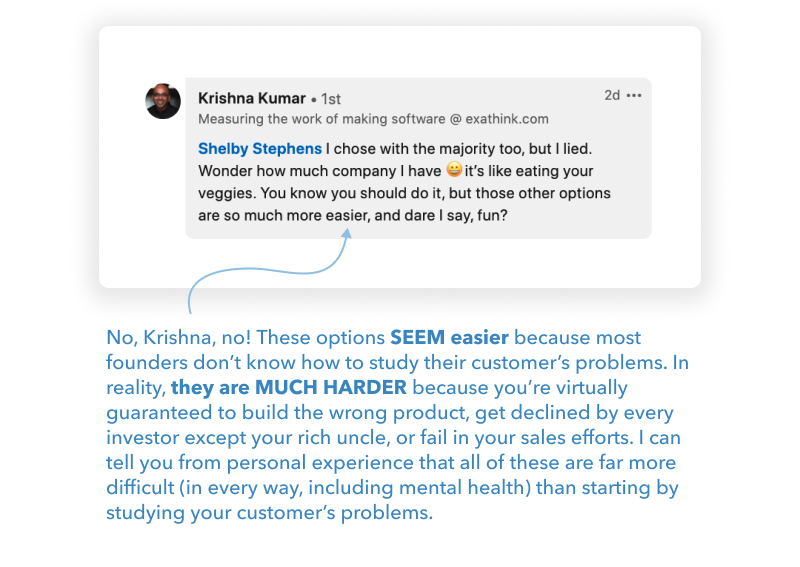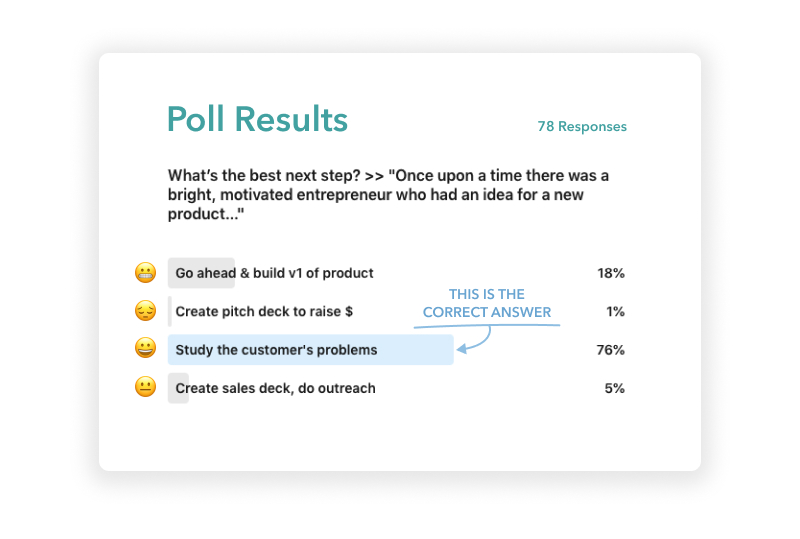You have a startup idea. What should you do next?
- Growth
- 10 mins
I recently ran a poll on LinkedIn. Here are the results:
Below, I’ll share my thoughts while also unpacking the results.
First, it’s awesome that so many people, over 75% of respondents, chose “Study the customer’s problems.” This is the right answer for nearly all startup scenarios. There may be rare cases in which the other paths are better choices, but I have never seen one.
If I had to pick a second-best answer, it would be “create sales deck, do outreach”. IMO this is still cart-before-the-horse if you haven’t sufficiently studied your customer’s problems, but this is the next best way to get at those problems (side note, I’ll write a post soon about what I believe constitutes “sufficient”).
The reason “sales” isn’t the best answer is because, if you start with sales and then you fail (e.g. you can’t get sales calls scheduled, you can’t close sales, whatever) (and, failure is virtually guaranteed), often you won’t know WHY you’re failing. Is it the wrong prospect? The pitch? The product? The pricing? Or perhaps you’re selling against a problem that isn’t severe, or for which there’s a great existing alternative, or maybe you’re promising an outcome that isn’t strongly desired? Or…
You’ve jumped ahead too far, and now you can’t pinpoint the problem. The fix here, of course, is to stop what you’re doing and go back to studying your customer’s problems. When you skip steps, you lose the ability to know the root cause of your problems.
Now, I understand some folks may not agree that the correct answer is to study the customer’s problems. Indeed, 24% of you disagree. To you, I would say two things: 1) a ton of really smart, experienced people think you’re wrong, and 2) if you don’t believe me, that’s fine, just give it a go with whatever path you think is right, and let me know in 3, 6, 9 or 12 months when you either built the wrong product and your customers won’t buy/use it, or you’ve wasted a ton of your (and other people’s) time having investor meetings that don’t result in checks, or you’ve done 20 sales demos and the only person who bought is your ex-colleague who wants to support you.
Back to the results. The majority here chose “Study the customer’s problems”, but in practice the percentage of founders who actually do this is way lower. Based on the founders I talk to (via Techstars as a mentor, training founders on the 1DA discovery methodology, or in the course of my day-to-day work), I’d estimate that somewhere in the low single digits, maybe 5% of all founders, actually start by studying their customer’s problems. This is captured perfectly in the following comment, which is impressively honest:

Why is there such a large gap between the 5% of founders who do this and the 76% of respondents who indicated it was the best path? I looked at the individual people who responded, and I can tell you this. Overall, the people who answered “Study their customer’s problems” are experienced. They’ve founded and/or worked at companies, they have the reps. They’ve seen the problems that arise downstream when you don’t start by studying the customer’s problems. In short, they’ve felt the pain of NOT beginning by studying the customer’s problems.
Embarrassingly, I founded 4 startups before I realized I should begin by studying my customer’s problems. I felt that pain, and learned the hard way.
So, if only 5% are starting by studying the customer’s problems, (even though all the experienced folks know you should start by doing this), that means 95% are starting by doing something else. What path do they choose instead?
I haven’t run a poll on this, but again anecdotally from the founders I talk to, I’d guess that about 90% of them start by beginning to build v1 of their product. I mean, they may do a few other things first, like make a logo or a website. Some of them may do a kind of obligatory version of customer discovery, where they schedule 2 or 5 or 15 calls and get (biased, low-fidelity, completely unreliable) feedback on their product idea. But they certainly are not studying the customer’s problems.
Now, I’m going to throw out a hypothesis that I have no data to back up, but probably seems super obvious to a lot of you. I hypothesize that there could be a causal relationship between a founder’s decision on how to start the business and their likelihood of success or failure. You’re probably thinking, “Well yeah, duh, of course how you start would impact whether you succeed or fail.” But I think there’s some nuance here that gets missed. And I think if this is true, and if more entrepreneurs knew it, they might take the less-miserable, much-higher-likelihood-of-success path forward beyond their initial idea.
I just Googled “what percentage of startups fail” and this is what appeared:

We’re playing fast and loose with numbers here, but I’d just like to point out that the percentage of startups that fail is the same as the percentage of startups who, in my estimate, begin by building v1 of their product. We don’t have time in this post to discuss all the pitfalls of doing so, but I’d just like to remind you that 76% of our brilliant poll respondents believe it’s a bad idea.
Personally, I get excited about the prospect of meaningfully impacting the percentage of startups that don’t fail. We all know the impact that just one single successful startup can have on the world, on making our lives or our planet better. What if we could simply move that fail rate from 90% to 80%? That’s twice as many big visions—for how our lives could be better—getting realized in the world. And don’t forget the opportunity costs avoided, and the huge downstream impact, of all the time that wouldn’t get wasted, and all the investor dollars that wouldn’t get burned for nothing.
The last thing I’d like to touch on here is the question of “Why?” Why do so many founders start by building v1 of their product idea? I think the answer here is pretty simple. Founders gravitate toward doing work that they know they can do, that feels like progress, that’s comfortable and familiar to them.
If they’re product-minded, that might mean building product. If they’re sales-minded, that might mean doing sales. If they’re growth-minded, that might mean doing growth experiments. But overall, building a product feels like progress. Your day-to-day is busy with design sprints and engineering work and the like. You have something you can show people, including investors. It’s just where most founders gravitate.
And, let’s not forget the overwhelming amount of advice on the internet that, more or less, says, “Quit your job! You can do it! They best way to start a startup is to just jump in and start!” This type of advice causes a lot of people a lot of pain.
To conclude, I just want to share that over the past five or six years, I personally have started with each of these four paths, and three of them created a lot of misery, wasted time and wasted money. The only one that didn’t was starting by studying my customer’s problems.
Questions? Disagree? I’d love to hear from you. HMU on LinkedIn or Twitter.
Next up, I’ll make a poll to see how people think founders should actually go about studying their customers’ problems. As you can probably guess, I have some opinions about that, too.
-Shelby

.webp)



